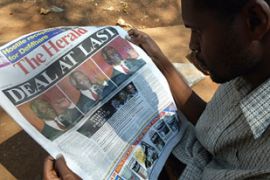Zimbabwe rivals to sign unity deal
African leaders converge in Harare to witness Mugabe and Tsvangirai bury differences and share power.

Cautiously optimistic
Al Jazeera’s Haru Mutasa, reporting from Harare, said that people cautiously optimistic about the deal.
“Generally people are glad that the election process is over and that something positive might come out of it,” she said.
“They have been through a lot Zimbabweans, from the beginning they have been made promises, promises that have not been delivered.
“They want the economy to be uplifted, they want jobs, they want their children to go to school, they want teachers to be paid well, they want basic services to be resuscitated, they are desperate, they are tired and once Morgan Tsvangirai is in power they hope he will work with Zanu-PF.”
Zanu-PF, the MDC and the smaller opposition grouping of Arthur Mutambara met in Harare on Saturday, agreeing to share out the 31 cabinet seats.
The powerful state security ministry was abolished while the justice portfolio was split into two and a new prisons department was formed.
‘Inclusive government’
The MDC national council endorsed the power-sharing agreement at a meeting on Sunday, a day after Mugabe’s inner politburo approved the deal.
“The national governing council has agreed to support this all inclusive government,” Nelson Chamisa, MDC spokesperson, said.
 |
| Tsvangirai’s MDC is expected to control the police [AFP] |
“It is hoped that this new deal will provide a new dawn and a new direction for the country, although there were some concerns on the issues of governors and the appointment of ministers by some of the members.”
The parties were meeting again on Monday to allocate ministries, with the MDC reportedly pushing to take control of home affairs, local government, one of the justice ministries, information and finance.
The name of the individual heads of the ministries are expected to be announced later in the week, according to a government minister.
David Coltart, an MDC senator, said in a message to his supporters that Tsvangirai would become prime minister with two opposition deputies.
“Although he [Tsvangirai] does not have absolute power, he does have substantial power,” he said.
“This is undoubtedly historic but we still have a long and treacherous road to travel.”
Virtually all of the cabinet ministers to be appointed by the opposition “have, at some stage in the past nine years, been brutalised on the instructions of those they will now have to work with,” Coltart said.
“Zimbabwe remains highly polarised and it will take statesmanship on all sides to make this work.”
Compromise deal
The compromise over the dual roles of Mugabe and Tsvangirai broke a deadlock that threatened to cause the collapse of the power-sharing talks that began in June.
In parliamentary voting in March, Zanu-PF got slightly more votes, but not the most parliamentary seats. Tsvangirai did not win enough votes to avoid a run-off against Mugabe.
State-sponsored violence against Tsvangirai’s supporters led him to boycott the presidential run-off and Mugabe was declared the overwhelming winner of the second vote widely denounced as a sham.
Long-simmering and major differences between the two sides and the nation’s worsening economic collapse are expected to put the power-sharing deal under massive pressure.